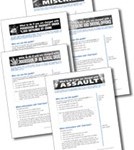Canadian Environment Week – Things To Know About The Use Of Pesticides
 June 2-8 is Canadian Environment Week and cities across the country are gearing up for activities to mark the occasion. Some of us may be taking the green route and biking to work, while others will be revisiting their local parks. As tradition goes, many of us will be rolling up our sleeves to commence spring cleaning. With a wide assortment of cleansers and detergents on the market today it may be worth taking a moment to consider the chemical components of cleaning supplies and what impact they have on our environment.
June 2-8 is Canadian Environment Week and cities across the country are gearing up for activities to mark the occasion. Some of us may be taking the green route and biking to work, while others will be revisiting their local parks. As tradition goes, many of us will be rolling up our sleeves to commence spring cleaning. With a wide assortment of cleansers and detergents on the market today it may be worth taking a moment to consider the chemical components of cleaning supplies and what impact they have on our environment.
If you have concerns about everyday chemical usage or pesticides you may want to take a look at the work done by West Coast Environmental Law. West Coast Environmental Law is an organization dedicated to advocating for environment-related issues through law. It offers legal advice, educational programs and advocacy for BC citizens seeking information on protecting our environment.
West Coast Environment features a number of useful information resources dealing with pesticides, including Pesticides and Your Health, Pesticides in Your Home and A Citizen’s Guide to Pesticide Use and the Law in BC, all of which you can find on Clicklaw.




